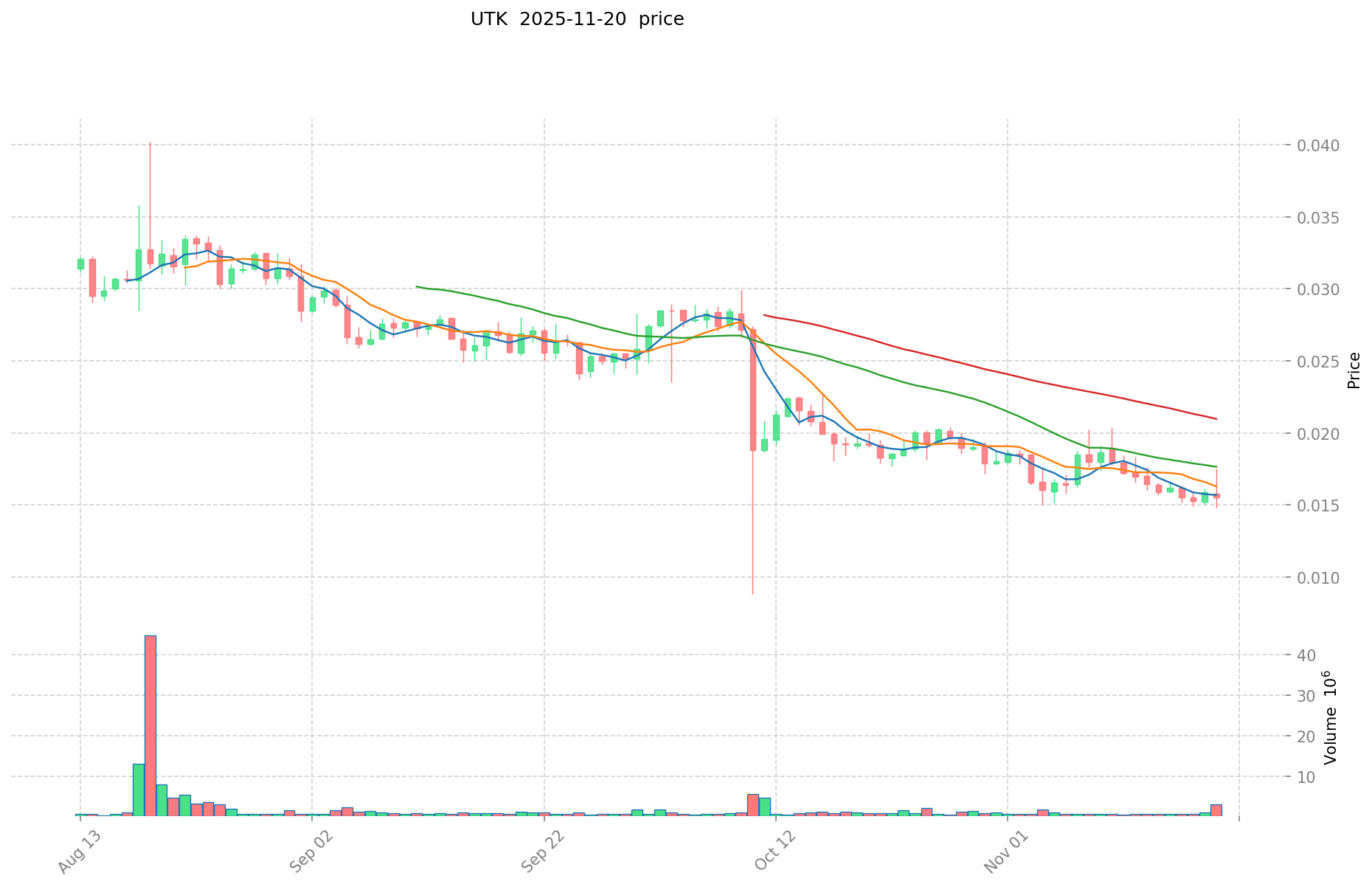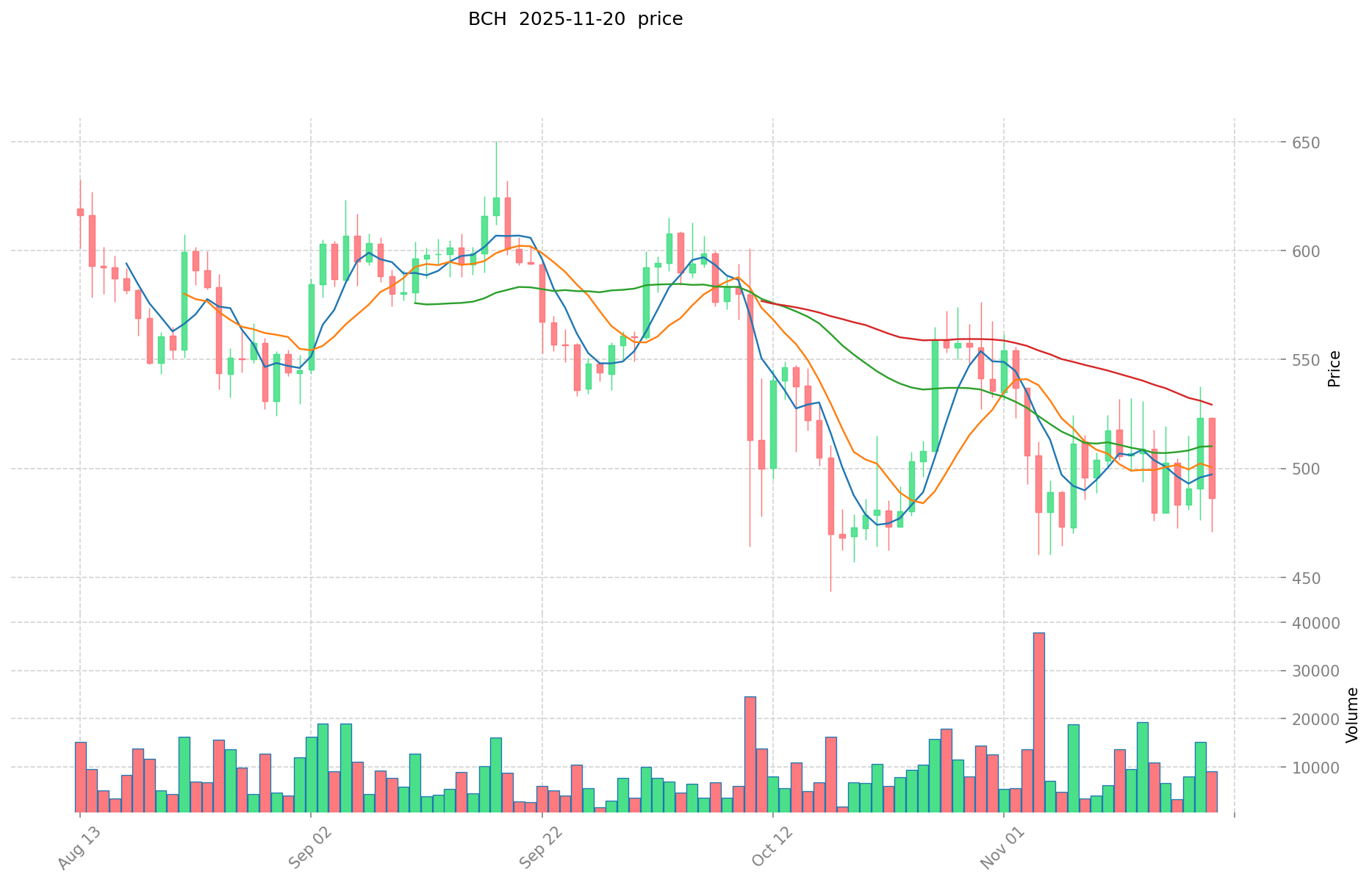UTK vs BCH: A Clash of Titans in the Cryptocurrency Arena
Introduction: UTK vs BCH Investment Comparison
In the cryptocurrency market, the comparison between UTK and BCH has always been an unavoidable topic for investors. The two not only differ significantly in market cap ranking, application scenarios, and price performance, but also represent different positioning in the crypto asset space.
UTK (UTK): Since its launch in 2017, it has gained market recognition for its focus on online transaction consumer protection and cross-border payments.
BCH (BCH): Introduced in 2017 as a hard fork of Bitcoin, it has been hailed as a solution for on-chain scaling and global adoption of cryptocurrency.
This article will comprehensively analyze the investment value comparison between UTK and BCH, focusing on historical price trends, supply mechanisms, institutional adoption, technological ecosystems, and future predictions, attempting to answer the question most concerning to investors:
"Which is the better buy right now?"
I. Price History Comparison and Current Market Status
UTK and BCH Historical Price Trends
- 2018: UTK reached its all-time high of $1.18 on January 9, 2018.
- 2017: BCH was created through a hard fork from Bitcoin on August 1, 2017, and reached its all-time high of $3,785.82 on December 20, 2017.
- Comparative analysis: During the 2018 crypto market downturn, UTK dropped from its high of $1.18 to a low of $0.00540831 on March 13, 2020, while BCH fell from its peak to a low of $76.93 on December 16, 2018.
Current Market Situation (2025-11-21)
- UTK current price: $0.01613
- BCH current price: $482.01
- 24-hour trading volume: UTK $29,209.29 vs BCH $6,539,362.47
- Market Sentiment Index (Fear & Greed Index): 11 (Extreme Fear)
Click to view real-time prices:
- View UTK current price Market Price
- View BCH current price Market Price


II. Core Factors Affecting the Investment Value of UTK vs BCH
Supply Mechanism Comparison (Tokenomics)
- UTK: Finite supply of 500 million tokens with a deflationary mechanism where tokens are burned through various platform activities
- BCH: Fixed supply cap of 21 million coins with a halving mechanism similar to Bitcoin, reducing block rewards every 4 years
- 📌 Historical pattern: Deflationary mechanisms like UTK's token burning tend to create upward price pressure during periods of high network activity, while BCH's halving events historically create cyclical price movements similar to Bitcoin.
Institutional Adoption and Market Applications
- Institutional holdings: BCH has attracted more institutional interest due to its longer history and Bitcoin heritage, being included in crypto investment products and funds
- Enterprise adoption: UTK excels in payment processing systems for e-commerce, while BCH focuses on peer-to-peer electronic cash systems and remittances
- National policies: BCH faces similar regulatory scrutiny as other cryptocurrencies in most jurisdictions, while UTK has worked on compliance within EU payment regulations
Technology Development and Ecosystem Building
- UTK technology upgrades: Focus on payment infrastructure, merchant solutions, and interoperability with various blockchain networks
- BCH technology development: Emphasis on scaling solutions, larger block sizes, and maintaining low transaction fees for everyday transactions
- Ecosystem comparison: BCH has a more developed infrastructure for payments and remittances, while UTK has built specialized solutions for e-commerce and payment processing with emerging DeFi applications
Macroeconomic Factors and Market Cycles
- Performance in inflationary environments: BCH positions itself as a hedge against inflation similar to Bitcoin, while UTK's value is more tied to payment processing adoption
- Macroeconomic monetary policy: Both are affected by broader crypto market movements in response to interest rates and USD strength, with BCH typically showing higher correlation to traditional crypto assets
- Geopolitical factors: BCH benefits from increased cross-border transaction demand during banking restrictions, while UTK's growth depends more on e-commerce adoption across different regions
III. 2025-2030 Price Prediction: UTK vs BCH
Short-term Prediction (2025)
- UTK: Conservative $0.014508 - $0.01612 | Optimistic $0.01612 - $0.0170872
- BCH: Conservative $400.0102 - $481.94 | Optimistic $481.94 - $636.1608
Mid-term Prediction (2027)
- UTK may enter a growth phase, with estimated prices ranging from $0.0140051366 to $0.0280102732
- BCH may enter a bullish market, with estimated prices ranging from $540.71354688 to $887.32479488
- Key drivers: Institutional capital inflow, ETF, ecosystem development
Long-term Prediction (2030)
- UTK: Base scenario $0.0307672843764 - $0.044304889502016 | Optimistic scenario $0.044304889502016+
- BCH: Base scenario $1132.146024457344 - $1596.32589448485504 | Optimistic scenario $1596.32589448485504+
Disclaimer: The above predictions are based on historical data and market analysis. Cryptocurrency markets are highly volatile and subject to change. This information should not be considered as financial advice.
UTK:
| 年份 | 预测最高价 | 预测平均价格 | 预测最低价 | 涨跌幅 |
|---|---|---|---|---|
| 2025 | 0.0170872 | 0.01612 | 0.014508 | 0 |
| 2026 | 0.023411076 | 0.0166036 | 0.009796124 | 2 |
| 2027 | 0.0280102732 | 0.020007338 | 0.0140051366 | 24 |
| 2028 | 0.02881056672 | 0.0240088056 | 0.019687220592 | 48 |
| 2029 | 0.0351248825928 | 0.02640968616 | 0.015845811696 | 63 |
| 2030 | 0.044304889502016 | 0.0307672843764 | 0.020921753375952 | 90 |
BCH:
| 年份 | 预测最高价 | 预测平均价格 | 预测最低价 | 涨跌幅 |
|---|---|---|---|---|
| 2025 | 636.1608 | 481.94 | 400.0102 | 0 |
| 2026 | 827.394592 | 559.0504 | 469.602336 | 15 |
| 2027 | 887.32479488 | 693.222496 | 540.71354688 | 43 |
| 2028 | 1161.7022587968 | 790.27364544 | 655.9271257152 | 63 |
| 2029 | 1288.304096796288 | 975.9879521184 | 653.911927919328 | 102 |
| 2030 | 1596.32589448485504 | 1132.146024457344 | 996.28850152246272 | 134 |
IV. Investment Strategy Comparison: UTK vs BCH
Long-term vs Short-term Investment Strategies
- UTK: Suitable for investors focused on payment scenarios and ecosystem potential
- BCH: Suitable for investors seeking stability and inflation-resistant properties
Risk Management and Asset Allocation
- Conservative investors: UTK: 20% vs BCH: 80%
- Aggressive investors: UTK: 40% vs BCH: 60%
- Hedging tools: Stablecoin allocation, options, cross-currency portfolio
V. Potential Risk Comparison
Market Risk
- UTK: Higher volatility due to smaller market cap and lower liquidity
- BCH: Susceptible to broader cryptocurrency market trends and Bitcoin price movements
Technical Risk
- UTK: Scalability, network stability
- BCH: Mining power concentration, security vulnerabilities
Regulatory Risk
- Global regulatory policies have different impacts on both assets
VI. Conclusion: Which Is the Better Buy?
📌 Investment Value Summary:
- UTK advantages: Focus on e-commerce payments, deflationary mechanism, potential for ecosystem growth
- BCH advantages: Larger market cap, established network, Bitcoin heritage, potential as digital cash
✅ Investment Advice:
- New investors: Consider a small allocation to both, with a higher percentage in BCH for stability
- Experienced investors: Balance between UTK and BCH based on risk tolerance and market outlook
- Institutional investors: BCH may be more suitable due to higher liquidity and established market presence
⚠️ Risk Warning: The cryptocurrency market is highly volatile. This article does not constitute investment advice. None
VII. FAQ
Q1: What are the main differences between UTK and BCH? A: UTK focuses on online transaction consumer protection and cross-border payments, while BCH is a hard fork of Bitcoin aimed at on-chain scaling and global adoption as a cryptocurrency. UTK has a finite supply with a deflationary mechanism, while BCH has a fixed supply cap similar to Bitcoin.
Q2: Which cryptocurrency has shown better historical price performance? A: BCH has shown better historical price performance, reaching an all-time high of $3,785.82 in December 2017, compared to UTK's all-time high of $1.18 in January 2018. However, both have experienced significant price fluctuations since their peaks.
Q3: How do the current market situations of UTK and BCH compare? A: As of 2025-11-21, BCH has a higher price ($482.01) and larger 24-hour trading volume ($6,539,362.47) compared to UTK's price ($0.01613) and trading volume ($29,209.29). The market sentiment index indicates extreme fear at 11.
Q4: What are the key factors affecting the investment value of UTK and BCH? A: Key factors include supply mechanisms, institutional adoption, technology development, ecosystem building, and macroeconomic factors. BCH has attracted more institutional interest and has a more developed infrastructure for payments, while UTK excels in e-commerce payment solutions.
Q5: What are the price predictions for UTK and BCH in 2030? A: For UTK, the base scenario predicts a range of $0.0307672843764 to $0.044304889502016, with potential for higher in an optimistic scenario. For BCH, the base scenario predicts a range of $1132.146024457344 to $1596.32589448485504, with potential for higher in an optimistic scenario.
Q6: How should investors allocate their assets between UTK and BCH? A: Conservative investors might consider allocating 20% to UTK and 80% to BCH, while aggressive investors might opt for 40% UTK and 60% BCH. The allocation should be based on individual risk tolerance and market outlook.
Q7: What are the potential risks associated with investing in UTK and BCH? A: Risks include market volatility, technical issues such as scalability and security vulnerabilities, and regulatory uncertainties. UTK may face higher volatility due to its smaller market cap, while BCH is more susceptible to broader cryptocurrency market trends.
Share
Content